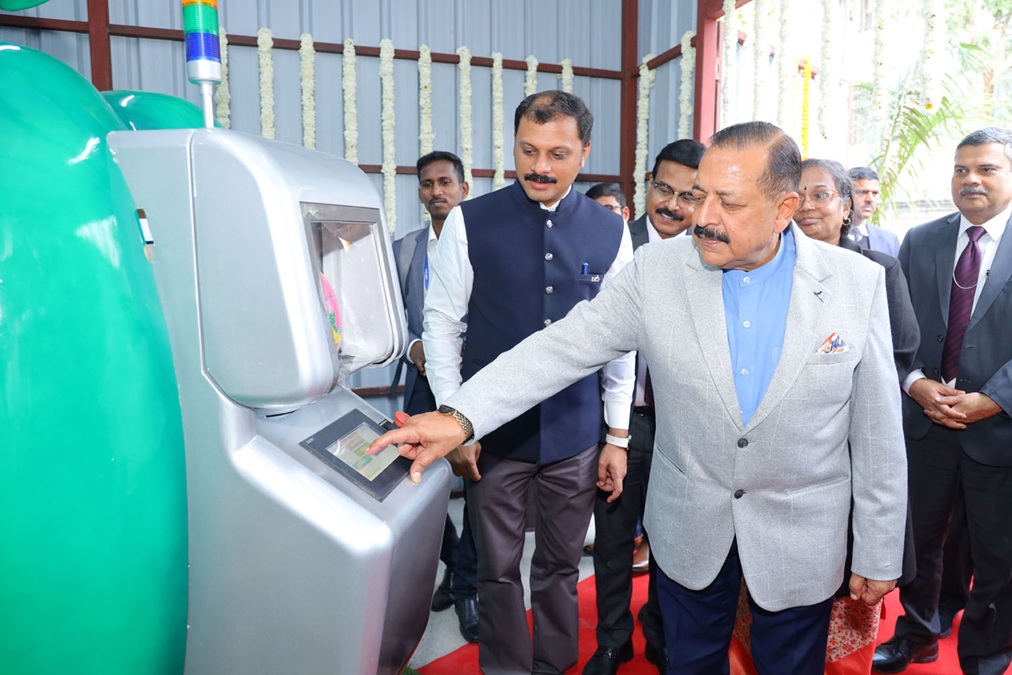

THIRUVANANTHAPURAM:
Union Minister for Science and Technology Dr. Jitendra Singh today launched at All India Institute of Medical Sciences (AIIMS) the first experimental prototype of an automated biomedical waste conversion rig that can disinfect pathogenic biomedical waste such as blood, urine, sputum, and laboratory disposables and convert them into soil additives.
The rig, christened as “Sṛjanam,” is developed by National Institute for Interdisciplinary Science and Technology (CSIR-NIIST), Thiruvananthapuram. It replaces costly and energy-intensive incinerators, besides imparting a pleasant fragrance to these foul-smelling toxic waste.
Formally commissioning the rig at the AIIMS campus, Dr Singh said the amount of biomedical waste produced in the country is on the increase. In 2021-22, biomedical waste generated was 700 tonnes per day. It went up to 743 tonnes per day within a year.
In this context, he said, quoting WHO statistics, the amount of daily pathogenic biomedical waste generation is 0.5 – 0.75 kg per bed in hospitals in the country. All of this is infectious and the nursing staff are getting maximum exposed to it.
Dr Singh said all the decisions of the present government are technology driven. This was evident from the first 100-day programme of the present government.
He said India is transforming into one of the biggest economic powers of the world. In this situation, we need to have an effective system in matters like waste disposal.
The function was attended by Tanmay Kumar, Secretary, MoEFCC; Dr. N Kalaiselvi, Secretary, DSIR & DG, CSI, Dr Rajiv Bahl, Secretary, DHR & DG, ICMR, Dr. V K Paul, Member, NITI Aayog, Dr. M Srinivas, Director, AIIMS New Delhi and Dr. C. Anandharamakrishnan, Director, CSIR-NIIST.
Dr Kalaiselvi said this is the latest among projects under the “waste to wealth” mission of the government. The equipment can convert 10 kg biowaste into biomanure in 30 minutes without any harmful effect to water, air and soil.
Dr. C Anandharamakrishnan, Director, CSIR-NIIST, proposed vote of thanks.
The prototype equipment, with a daily capacity of 400 kg, can handle 10 kg degradable medical waste per day in the initial phase. The technology, once validated, will be ready for full-scale implementation after securing approval from competent authorities.
“With its potential to transform treated waste into value-added soil additives with minimal human intervention, our technology provides a safer solution for healthcare facilities, avoids the risk of spills and occupational exposure, and assists in preventing uncontrolled spread of infectious microbes,” said Dr. C Anandharamakrishnan.
more recommended stories
Strategic collaboration to establish India’s first.
NEW DELHI: Motorola, a global leader.
കൊച്ചി: ആഗോള സംരംഭങ്ങള്ക്ക് കരുത്തേകാന് എഐ അധിഷ്ഠിത.
കൊച്ചി: ഇന്ത്യയിലെ പ്രമുഖ കണ്സ്യൂമര് ഇലക്ട്രോണിക്സ് ബ്രാന്ഡായ.
WAYANAD: Kerala Fibre Optic Network (KFON).
THIRUVANANTHAPURAM:IIT Patna emerged as the winner.
MUMBAI:CyberArk (NASDAQ: CYBR), the global leader.
KOTTAYAM: AYUSH institutions in all States.
THIRUVANANTHAPURAM: Kerala State IT Mission in.
THIRUVANANTHAPURAM:TKM College of Engineering, Kollam, and.